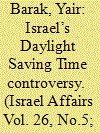|
|
|
Sort Order |
|
|
|
Items / Page
|
|
|
|
|
|
|
| Srl | Item |
| 1 |
ID:
176748


|
|
|
|
|
| Summary/Abstract |
Daylight Saving Time (DST) policies have been in use since early in the 20th century. However, their energy saving effect is under review. The generalization of LED lighting has reduced the impact of lighting energy on the total energy consumption and, therefore, the effect of DST has been reduced. Nevertheless, in order to design an effective new policy in this aspect, it is necessary to understand how total electricity consumption would be affected by it but also how the load daily profile would change. This paper proposes an hourly load model that quantifies the effect of daylight on electricity consumption and simulates the effect of different DST policies. The model is applied to the inland Spanish electricity system and the three scenarios more likely to be implemented if current DST policy is changed: year round winter time (UTC+1), year round summer time (UTC+2) and keep DST but change clock 1 h back (GMT). The results show how changes in sunrise and sunset times affect daily load profiles. They provide overall, monthly and hourly energy savings for each scenario that are necessary for a well-informed DST policy design and implementation.
|
|
|
|
|
|
|
|
|
|
|
|
|
|
|
|
| 2 |
ID:
171372


|
|
|
|
|
| Summary/Abstract |
The European Union has recently decided to stop the policy of biannual clock changes in 2021. One reason is that the original rationale for the policy, energy savings, is not supported by a large portion of recent empirical studies. Whether the new permanent time will be standard time or the former daylight saving time has not been decided. Evidence on energy savings from daylight saving time is country-specific, and each country may choose its own time. We examine the effects of the policy in a country for which no studies on daylight saving exist, Slovakia. Using hourly data from the 2010–2017 period, we apply a difference-in-differences approach and estimate energy savings to equal 1% of annual electricity consumption. Alternatively, extrapolating the effect from the results of a previous meta-analysis on different countries, for Slovakia we obtain a smaller estimate, unlikely to exceed 0.5%. Moreover, our findings suggest that daylight saving time smooths the electricity demand curve.
|
|
|
|
|
|
|
|
|
|
|
|
|
|
|
|
| 3 |
ID:
105774


|
|
|
|
|
| Publication |
2011.
|
| Summary/Abstract |
This paper examines the impact of daylight saving time (DST) on electricity consumption in southern Norway and Sweden. As DST was implemented in both the countries in 1980, we do not have a clear counterfactual in the form of a control period to identify the impact of DST directly with before and after or with and without analysis. This problem in the study is resolved by using "equivalent day normalization technique" to identify the impact of DST. The difference-in-difference (DID) average treatment effects model suggests an annual reduction of at least 1.0 percent in electricity consumption for both Norway and Sweden due to DST. The average annual electricity consumption reduction corresponding to DST effects equals 519 and 882 GWh for southern Norway and Sweden, resulting in an annual financial saving of 16.1 million Euros and 30.1 million Euros, respectively. The distribution of treatment effects across different hours of the day indicates a small but significant reduction in electricity consumption during the morning and a steep decline during the evening hours in both countries.
|
|
|
|
|
|
|
|
|
|
|
|
|
|
|
|
| 4 |
ID:
150383


|
|
|
|
|
| Summary/Abstract |
Since 1970 Chile has had a Daylight Saving Time (DST) policy in order to reduce residential electricity consumption in the country. The time change was set for the first time by executive decree in 1970, and since that date it was applied every year without great changes until 2010. Since then, and to date, decrees have been set in order to increase the duration of the DST, arguing that there are reasons associated with energy savings that justify the extension of the measure that has been adopted by the authority in recent years. In the present study the impact of the application of DST in terms of decreased household electricity consumption is analyzed using two complementary methods, one based on a heuristic approach and the other using an econometric model. The results indicate that there is indeed a marginally small reduction in residential electricity consumption, although these results are not homogeneous throughout the country.
|
|
|
|
|
|
|
|
|
|
|
|
|
|
|
|
| 5 |
ID:
174579


|
|
|
|
|
| Summary/Abstract |
From its establishment until 2013, the issue of Daylight Saving Time (DST) featured on Israel’s political agenda with the religious sector opposing by and large its implementation as an infringement on religious rituals and a disruption of the Hebrew-Jewish calendar and secularists presenting their struggle for DST as a fight of progress (light) against reactionary forces (dark).
|
|
|
|
|
|
|
|
|
|
|
|
|
|
|
|
| 6 |
ID:
111459


|
|
|
|
|
| Publication |
2012.
|
| Summary/Abstract |
Many countries have experimented with daylight saving time (DST) to save energy and to align human activities more closely to the daily cycle of light and darkness. Using a novel methodology, we estimate the year-round energy savings to be obtained from advancing Indian Standard Time (IST), from the introduction of DST, and from dividing the country into two time zones. We find that the option of advancing IST consistently saves more energy than the corresponding DST option, which in turn saves more energy than the corresponding time zones option. This is because the energy benefits of advancing IST accrue for the entire year throughout the country, whereas the benefits of DST are confined to summer months and the benefits of two time zones are largely in the lower energy consuming eastern region. We recommend advancing IST by half-hour to being six hours ahead of UTC. This confers the advantages of DST and time zones without their disadvantages and is forecast to save more than 2 billion kWh of electricity every year during evening peaks that are difficult to supply. While these results are India-specific, similar exercises would be useful to many other countries.
|
|
|
|
|
|
|
|
|
|
|
|
|
|
|
|
|
|
|
|
|